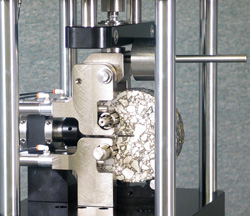 [apologies to Jim Morrison… wherever he may be]
[apologies to Jim Morrison… wherever he may be]
One of the toughest things to do in analysis of asphalt pavements is to characterize cracking performance, particularly at intermediate temperatures.
There are tests that can easily be performed on cores, but they may not have a great correlation with performance. Then there are tests that have some correlation with performance, but which require specimen sizes that are not very easy to obtain from pavements.
Now, however, there are several newer cracking tests that seem promising in that they can use standard 6-inch field cores and appear to have better correlation to intermediate (fatigue or top-down) cracking performance. One such test is the Disk-shaped Compact Tension – DC(t) – test.
The DC(t) procedure (ASTM D7313) is a fracture energy test for asphalt mixtures that was modeled after a basic fracture toughness test for metals. The test was developed by researchers at the University of Illinois to evaluate the cracking performance of field cores and laboratory-compacted HMA samples. The DC(t) specimen is cylindrical, with a single-edge notch, loaded on its side. A gauge is placed at the notch. The opening of the “crack mouth” is recorded as the specimen is loaded at 1mm/min. in tension. The fracture energy is calculated using specimen dimensions and the area under the load-displacement curve. The test is generally valid at temperatures of ~10° C (50° F) and lower.
The fracture energy measured from the DC(t) test has been successfully used on several projects to describe the cracking resistance of asphalt pavement. In particular, the test has been shown to discriminate between polymer-modified asphalt mixtures more broadly than the indirect tensile strength parameter most commonly used in the past.
The Asphalt Institute recently acquired the ability to perform the DC(t) test, including the acquisition of a new servohydraulic test frame. Among other research projects, it will be used extensively on a project studying non-load related distresses of airfield asphalt pavements.
What does all this mean? If the DC(t) procedure can be successfully used to relate to the intermediate cracking performance of asphalt mixtures, then pavement analysts won’t have to choose between easy – but not so good, and good – but not so easy.
For more information or to get a quote on performing the DC(t) test for asphalt mixtures, please contact either Mike Anderson (manderson@asphaltinstitute.org) or Phil Blankenship (pblankenship@asphaltinstitute.org) of the Asphalt Institute Lab.













